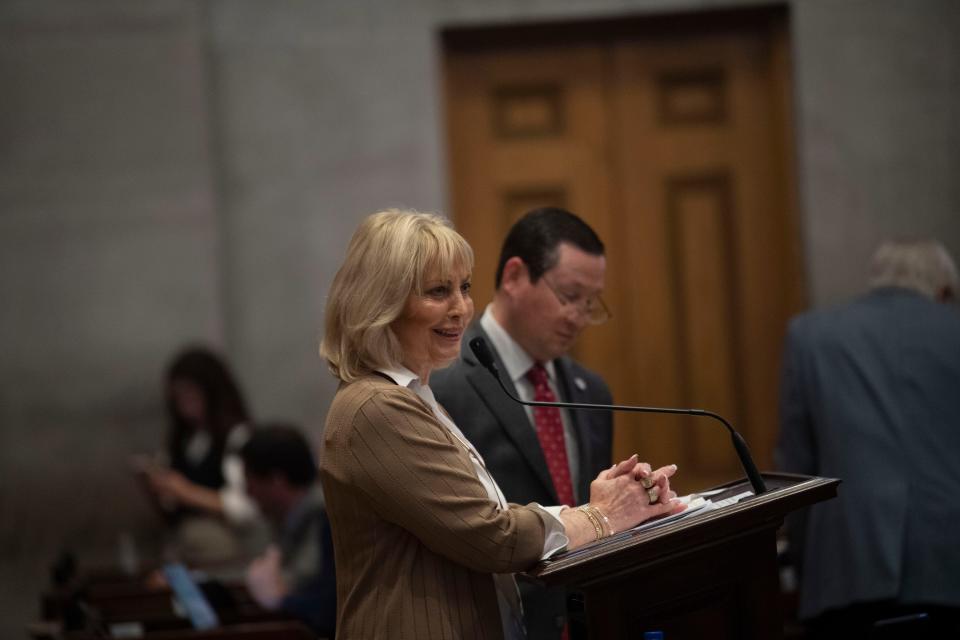Why Tennessee lawmakers redirected $3M in maternal health funds to crisis pregnancy centers
Earlier this year, Tennessee Gov. Bill Lee proposed $3 million for a maternal health pilot program, aimed at addressing a pressing need to improve health outcomes for expectant mothers in a state ranked third worst in the country on maternal mortality issues.
Now, the General Assembly will redirect that grant money to crisis pregnancy centers, Republican-lauded anti-abortion organizations that are unregulated by state health standards and may not offer comprehensive health services.
During a budget vote on Thursday, House Republicans voted down efforts by Rep. Aftyn Behn, D-Nashville, to impose privacy regulations on grantees or require them to base services on medically accurate information. Democrats have criticized the crisis pregnancy funding as a failure to address root health risks faced by expectant mothers in Tennessee.
Rep. Patsy Hazlewood, R-Signal Mountain, said during the House budget vote that lawmakers had to make tough decisions during a difficult budget year and indicated lawmakers didn't want to fund an untested pilot program. Tennessee recently administered $6.5 million to 10 crisis pregnancy centers across the state from a Lee-backed grant fund established last year.

"We are familiar with what they do, we are comfortable with how they do it and it did not seem the year to make a change in that direction," Hazlewood said.
When asked to comment, Lee's office did not offer specifics about the original intended maternal mortality pilot program, though legislation initially proposed last year would have established a TennCare program to provide remote health monitoring services for at-risk pregnancies.
Senate Democratic Caucus Chair London Lamar, D-Memphis, sharply criticized the budget decision to redirect the funds. Lamar, who has been open about her own maternal health crisis during her first pregnancy, has long championed increased maternal health interventions to better safeguard expectant and new mothers.

Lamar said she was infuriated by the plan to put more funds toward "programs that have shown no data that they actually work."
"What's even more dangerous is the funding was supposed to fill gaps in areas where they didn't have access to a doctor," Lamar said. "This is anti-life, this is not pro-life legislation. Every mother should be up in arms about the state once again neglecting to fund necessary health care services for moms and babies."
Lee last year proposed a whopping $100 million appropriation to the controversial crisis pregnancy centers. Budget negotiations eventually decreased the pot to $20 million, which funded a program later called Tennessee Strong Families.
The Strong Families grants were originally available to organizations that could include medical services, but the program was also open to mental health and counseling services for pregnant women, support for parents considering adoption, workforce assistance for new moms, and housing assistance.
The state distributed $18.9 million to 28 organizations earlier this year. A review by The Tennessean found the state granted $6.5 million to 10 crisis pregnancy centers like the Old Hickory-based Pregnancy Care Center, which offers pregnancy tests and ultrasound referrals along with services like "maternity and infant supplies." The remaining $12.4 million was distributed to medical organizations such as Methodist Le Bonheur Community Outreach and nonprofit or religious groups like Catholic Charities.
The Tennessee Department of Health does not license crisis pregnancy centers, nor are they overseen by the state Health Facilities Commission, which is tasked with licensing medical facilities.
Any trained medical professionals on staff are required to be individually licensed to practice in Tennessee by one of the state’s Health Professional Boards, but it's often unclear if the centers have any licensed medical providers on site, as websites and tax forms for many of the state’s crisis pregnancy centers do not provide detailed information on staffing.
Critics of the centers argue the faith-based facilities can give medically inaccurate anti-abortion counseling to mislead women in crisis, while proponents say they serve a growing need in the community to better prepare parents dealing with unexpected pregnancies.
When asked if Lee believes crisis pregnancy centers can provide the same level of intervention for high-risk expectant mothers as medical maternal health programs, Lee's office said it is "pleased that improving access to maternal healthcare and boosting critical resources for Tennessee mothers, children and families is being prioritized."
This article originally appeared on Nashville Tennessean: TN lawmakers redirect maternal health funds to crisis pregnancy centers

